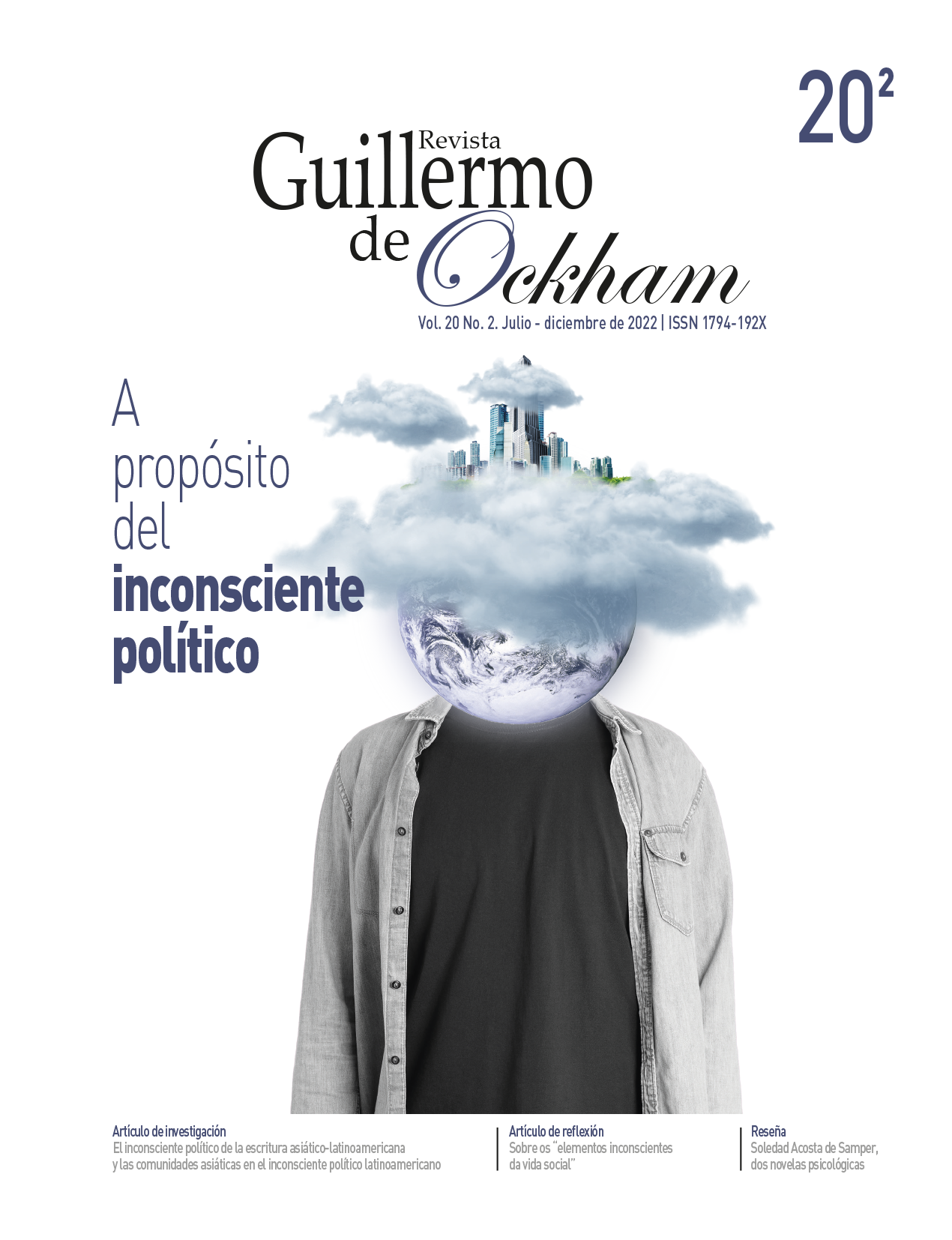The Revista Guillermo de Ockham provides an immediate and open access to its content, based on the principle of offering the public a free access to investigations to provide a global interchange of knowledge.
Unless otherwise established, the contents of this journal has a license with Creative Commons Attribution-NonCommercial-NoDerivatives 4.0 International (CC BY-NC-ND 4.0) http://creativecommons.org/licenses/by-nc-nd/4.0/
- Attribution: You must give appropriate credit, provide a link to the license, and indicate if changes were made. You may do so in any reasonable manner, but not in any way that suggests the licensor endorses you or your use.
- NonCommercial: You may not use the material for commercial purposes.
- NoDerivatives: If you remix, transform, or build upon the material, you may not distribute the modified material.
- No additional restrictions: You may not apply legal terms or technological measures that legally restrict others from doing anything the license permits.
Resumo
O inconsciente político da escrita asiático-latino-americana e
Comunidades asiáticas no inconsciente político latino-americano
Ignacio Lopez-Calvo
Universidade da Califórnia, Merced
Dando uma reviravolta na teoria de Fredric Jameson sobre a importância da luta de classes para acessar o inconsciente político nos estudos literários e sobre o uso da narrativa como método para reprimir coletivamente as contradições históricas, neste ensaio proponho desviar ou acrescentar outro tipo de repressão histórica contradição: as lutas e conflitos étnicos com os quais as sociedades majoritárias latino-americanas oprimiram e marginalizaram através do colonialismo interno e até mesmo comunidades deportadas de origem asiática. Nesse contexto, este ensaio explora o que está oculto ou reprimido, consciente ou inconscientemente, no discurso literário diaspórico das comunidades asiático-latino-americanas.
Referências
Althusser, Louis, Étienne Balibar, et al. (2016). Reading Capital. Translated by Ben Brewster. London, New York: Verso, [1970].
Arquedas, José María (1961). El sexto. Perú: Ed. Juan Mejía Baca.
Chao Romero, Robert (2010). The Chinese in Mexico, 1882–1940. Tucson: The University of Arizona Press.
Davis, Mike (1990). City of Quarz: Excavating the Future in Los Angeles. New York: Vintage.
Dowling, William C. (1984) Jameson, Althusser, Marx. An Introduction to the Political Uncosncious. Ithaca, New York: Cornell UP.
Emmerson, John K (1978). Japanese and Americans in Peru. The Japanese Thread. John K. Emmerson. New York: Holt, Rinehart & Winston. pp. 125-49.
Herbert, Julián (2016). La casa del dolor ajeno. Crónica de un pequeño genocidio en La Laguna. Random House.
Higa, Augusto (1994). Japón no da dos oportunidades. Lima: Generación 94.
Higashide, Seiichi (2000). Adiós to Tears: The Memoirs of a Japanese-Peruvian Internee in U.S. Concentration Camps. Foreword, C. Harvey Gardiner; preface, Elsa H. Kudo; epilogue, Julie Small. Seattle: University of Washington Press.
Higashide, Seiichi (1981). Namida no Adiósu: Nikkei Peru imin, Beikoku kyosei shuyo no ki. Tokyo: Sairyusha.
Jameson, Fredric (1983). The Political Unconscious: Narrative as a Socially Symbolic Act. Ithaca, New York: Cornell University Press [1981].
Kakazu, Agenor (1988). Crônicas De um Garoto que Também Amava os Beatles e os Rolling Stones. São Paulo: Literarte.
Khaorin (Fernando Tamura) (1996). Poema para Você. São Paulo Alínea.
Lesser, Jeffrey (2007). A Discontented Diaspora: Japanese Brazilians and the Meanings of Ethnic Militancy, 1960-1980. Durham, NC: Duke University Press.
López-Calvo, Ignacio (2021). “Biopolitics, Orientalism, and the Asian Immigrant as Monster in Salazar’s La medianoche del japonés and Rodríguez’s Asesinato en una lavandería china.” Beyond the West: Cultural and Literary Dialogues Between Asia and Latin America. Edited by Goriça and Axel Gasquet. Palgrave-MacMillan. pp. 121-141.
López-Calvo, Ignacio (2019). Japanese Brazilian Saudades: Diasporic Identities and Cultural Production. Loisville, Colorado: UP of Colorado.
López-Calvo, Ignacio (s.f.). The Mexican Transpacific: Nikkei Writing, Visual Arts, Performance. Vanderbilt UP (en prensa).
López-Calvo, Ignacio (en prensa). “Were Issei in Brazil imperialists? Migration-driven expansionism in Nikkei literature”. The Japanese Empire and Latin America. Edited by Sidney Xu Lu and Pedro Iacobelli. Hawaii University Press.
Mbembe, Achille (2003). Necropolitics. Public Culture, vol. 15(1), pp. 11-40.
Puig, Juan (1993). Entre el río Perla y el Nazas: La China decimonónica y sus braceros emigrantes, la colonia china de Torreón y la matanza de 1911. México: Consejo Nacional para la Cultura y las Artes.
Rivas, Beatriz (2017). Jamás, nadie. Alfaguara.
Rodríguez, Juan José (1996). Asesinato en una lavandería china. Sinaloa, México: Conaculta.
Salazar, Jorge (1991). La medianoche del japonés. Lima: El Barranco.
Schiavone Camacho, Julia María (2012). Chinese Mexicans: Transpacific Migration and the Search for a Homeland 1910-1960. Chapel Hill: University of North Carolina Press.
Siu, Lok C. D. (2005). Memories of a Future Home: Diasporic Citizenship of Chinese in Panama: Stanford, California: Stanford University Press.

 Perfil Google Scholar
Perfil Google Scholar

























